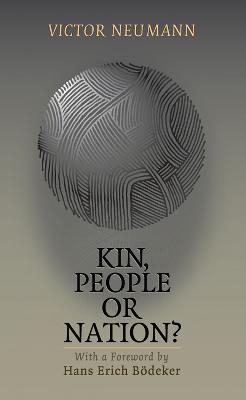
Kin, People or Nation?
Scala Arts & Heritage Publishers Ltd (Verlag)
978-1-78551-374-9 (ISBN)
"Starting from the history of concepts, Victor Neumann shows how the variety of connotations associated with the ideas of 'nation' and 'people' have been circumscribed in south-eastern Europe, holding back the region over many decades. More important, with erudition and seriousness of purpose, he mounts a defence of a notion of identity that is neither fixed nor monocultural, and proposes a legal definition of 'nation' that can resist exclusivist or racist versions. In an age when counter-rational fantasies about identity seem to be prevailing, when many seem unaware of or have forgotten where such thinking leads, Neumann's is a much-needed voice of reason." — Dan Stone, Professor of Modern History, Royal Holloway, University of London
With a focus on the origins and evolution of political identity, this book explores the way different linguistic communities have defined kin, ethnicity, citizenship and the nation. As Neumann traces the transition over the last two centuries of European history, from the medieval to the modern age, he pays particular attention to the idealistic philosophies that have influenced the intellectual landscape and political discourse of European regions today, and which have intensified the division between East and West in terms of cultural norms, legislation and administration.
Victor Neumann is a Romanian historian, political analyst, Professor of Romanian and European Intellectual History at the Bucharest National University of Arts and Senior Researcher at the Romanian Academy of Sciences. He is a well-known specialist in the recent cultural and intellectual histories of Eastern and Central Europe.
Illustrations
Foreword
Preface
Chapter I – JULES MICHELET’S CONCEPT OF PEUPLE
1. Commentary on its origins and meanings
2. Michelet’s interrogations
3. Challenging Thierry’s arguments
4. When le peuple becomes la nation
5. The social myth
6. Le peuple and geographical determinism
7. The distinguishing features of Michelet’s concept of peuple
Chapter II – VOLK (PEOPLE) AND SPRACHE (LANGUAGE):
HERDER’S THEORIES OF ETHNICITY AND THE NATION
1. For a new comprehension of Herderian ideology
2. The ‘genius’ of Sturm und Drang
3. ‘Songs are the people’s archive’ – Prussia’s German aspirations, embodied by Kulturnation
4. The spirit of the people, viewed from a scientific perspective
5. The purity of Volk and the organic nation
Chapter III – THE NATION: THE MEANINGS OF A HISTORICAL-POLITICAL CONCEPT
1. What is a Nation?
2. The concept of nation in contemporary Europe
3. Why does the concept of nation need to be redefined in relation to Central and South eastern Europe?
Chapter IV – KIN AND PEOPLE: THE CHARACTERISTICS OF ROMANIAN ETHNOCENTRISM
1. Geographical variations of European culture and politics
2. Symbolic figures and Romanian conceptual confusions
3. The racial connotations of kin
Chapter V – THEORETICAL ANALYSIS OF THE ROMANIAN CONCEPT OF NATION
1. Hostility towards diversity or the fantasy of the organic nation
2. Refusal of discontinuity, or the confusion between the old patriarchal society and the modern nation: a neo-Romantic perspective on the beginnings of the Romanian nation
3. The return to Herder
4. The uniqueness of ethnic culture or a further discussion of the idea of nation
Chapter VI – MULTICULTURAL PHILOSOPHY: A COMPARATIVE PERSPECTIVE
1. The education and philosophy of multicultural differentialism: observations on Charles Taylor’s perspective
2. Ideological meanings of multiculturalism: observations on Habermas’s objection to Taylor
3. Harvey Siegel’s contribution: transculturality
4. Conditions leading to false premises of multiculturalism
5. The concept of multiple identity
Conclusions
Notes
Bibliography
Index
| Erscheinungsdatum | 14.02.2022 |
|---|---|
| Übersetzer | Gabi Reigh |
| Verlagsort | London |
| Sprache | englisch |
| Maße | 138 x 216 mm |
| Gewicht | 365 g |
| Themenwelt | Geisteswissenschaften ► Geschichte ► Regional- / Ländergeschichte |
| Geisteswissenschaften ► Sprach- / Literaturwissenschaft ► Sprachwissenschaft | |
| Sozialwissenschaften | |
| ISBN-10 | 1-78551-374-5 / 1785513745 |
| ISBN-13 | 978-1-78551-374-9 / 9781785513749 |
| Zustand | Neuware |
| Haben Sie eine Frage zum Produkt? |
aus dem Bereich


